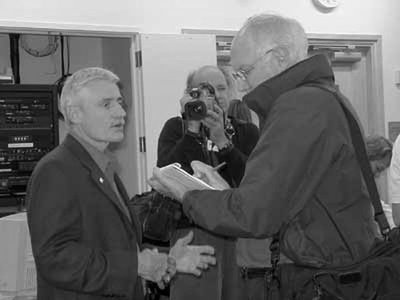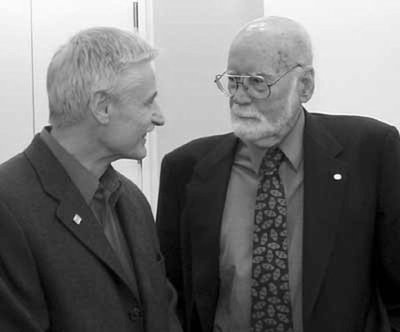October 11, 2001
Hartwell wins Nobel Prize
Dr. Lee Hartwell, president and director of the Fred Hutchinson Cancer Research Center and also professor of genetics and adjunct professor of medicine at the University of Washington, is one of three researchers to share the 2001 Nobel Prize in Physiology or Medicine. The award was announced early Monday morning, Oct. 8.
The Nobel Assembly at the Karolinska Institute in Stockholm, Sweden, selected Hartwell for his pioneering work in yeast genetics. He shares the honor with Drs. Paul Nurse and Timothy Hunt, both of the Imperial Cancer Research Fund in London. The researchers will receive the award in Stockholm on Dec. 10, the 100th anniversary of the death of Alfred Nobel, after whom the award is named.
Hartwell, who conducted most of his groundbreaking research in the UW Department of Genetics, is being honored for the discovery of the universal mechanism that controls cell division in all eukaryotic (nucleated) organisms, from yeast to frogs to humans. Using yeast as a model organism, he was the first to harness the tools of genetics to study how cells function – to determine which genes cause cells to divide.
“Those who know Lee Hartwell and his work have long hoped that this day would come,” said Dr. Paul G. Ramsey, UW vice president for medical affairs and dean of the School of Medicine. “In the finest tradition of the Nobel Prize, his contributions to cancer research have enabled others to go on and make countless advances of their own. All of us at the University of Washington Academic Medical Center celebrate this richly deserved recognition of a truly world-class bioscientist who is also a fine colleague and friend.”
The regulation of cell division – how cells determine when and how to multiply or otherwise develop, and how that process can go awry – is fundamental to understanding how cancer cells mutate and to developing approaches that predict, prevent or reverse that mutation.
“People just didn’t understand the fundamentals of cell-division regulation until Lee came along,” said colleague Dr. James Roberts, a Howard Hughes Medical Institute investigator and member of the Hutchinson Center’s Basic Sciences Division.
“What Lee did 25 years ago was essentially provide us with a list of all the important genes involved in controlling cell proliferation. This has proven to be invaluable in interpreting and using today’s gene-sequence data,” he says. “Second, Lee provided a logical framework to understand how these genes cooperate and work together to control cell division. Thus, he was not merely a cataloger of genes, but he also was able to explain how they worked.”
Hartwell decided more than 30 years ago to study yeast cells because they are simpler and easier to manipulate than human cells. At the time, Hartwell recalls, this was “a fairly risky assumption,” as he was the only person looking at yeast cells to find genes that control cell development. Thanks to Hartwell’s groundbreaking efforts, scientists now know that yeast is a superb model for studying many basic cellular processes, since its cellular machinery is found in virtually all nucleated organisms. Today, the yeast-related research of Hartwell and his colleagues is being used at the Hutchinson Center to develop drugs for use against cancer and other diseases.
Hartwell joined the University of Washington faculty in 1968 and has been a professor of genetics since 1973. He also is an adjunct professor of medicine at UW. In 1996 he joined the faculty of the Hutchinson Center and in 1997 became its president and director.
Hartwell is the recipient of many national and international scientific awards for his work in cell-cycle biology, including the Leopold Griffuel Prize, the Massry Prize, the American Cancer Society’s Medal of Honor Basic Research Award, the Albert Lasker Basic Medical Research Prize, the General Motors Sloan Award and the Gairdner Foundation International Award for Achievements in Science. He is a member of the National Academy of Sciences.
Hartwell is Hutchinson Center’s second Nobel laureate; the first was Dr. E. Donnall Thomas, who in 1990 won a joint prize in physiology or medicine for his seminal work in bone-marrow transplantation, which is now used worldwide as a successful treatment for leukemia and other diseases. Thomas is also a UW professor emeritus of medicine (oncology).
The UW also has three other Nobel laureates: Dr. Hans Dehmelt, who in 1989 received a prize in physics for the development of the ion trap technique; and Drs. Edmond Fischer and Edwin Krebs, who in 1992 received a joint prize in physiology or medicine for discovering certain proteins that are important in cell-to-cell communication.
Since 1901, Nobel Prizes have been awarded annually on the anniversary of the death of Alfred Nobel, the Swedish-born inventor and international industrialist for whom the award is named. In addition to physiology or medicine, Nobel Prizes are awarded in physics, chemistry, literature, economic sciences and peace.
For more information, see the Hutchinson Center’s Web site at http://www.fhcrc.org and the Nobel Foundation Web site at http://www.nobel.se.




